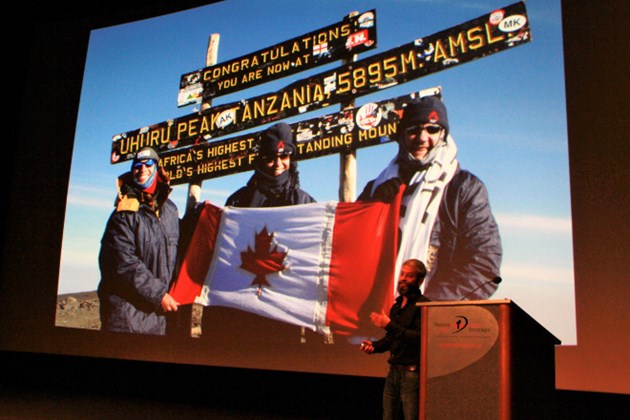Northern Ontario Business - Nov 17, 2017

Robert Patterson shared tales from his globetrotting career in mining during a Nov. 16 presentation in Sudbury.
One wouldn't think a computer science degree and a career in technical support would lead to climbing mountains and flying planes over Africa or shooting rocket-propelled grenades (RPGs) in Mongolia.
For Robert Patterson, it did.
And he was happy to talk about how obtaining a degree from Laurentian University led to all that and the founding of his current business, Minalytix, a mining software company, during a Nov. 16 talk hosted by the Sudbury chapter of the Canadian Institute of Mining, Metallurgy and Petroleum.
While his lighthearted talk spanned his entire life, peppered with many self-deprecating stories, the message was clear: do a job well, never stop learning and have some fun with your life.
"I never thought my degree would take me around the world and I'd be doing all these things, but it did. Your degree does not limit what you will do with your life," Patterson said.
Describing himself as tech support and an entrepreneur, he passed on many tips as he took the audience, made up mostly of mining and engineering students, for a tour of his life, from his parents enrolling him in violin and French classes (and making him stick it out) to choosing his career path, which he said boiled down to staying in Sudbury, going to Laurentian, and choosing between kinesiology, engineering or computer sciences.
"This was 1999, and I thought, 'Computers aren't going away, so I think I can get a job in this," he said.
"You've got to do what you love, but make sure it's going to pay the bills as you start down your adult career."
While still in school, he took a co-op with Eloquip, which was the first piece of advice he passed on to students: if an internship comes their way, take it.
"It's real-world experience, figuring out what I was going to do for the next 30 years of my life, and it was a paid internship," he said.
When I graduated I didn't have any student debt, so you really should consider it."
Patterson's next co-op placement was with Century Systems Technologies. The firm created software to collect and store drill hole sample information, a different experience for him.
His first job was installing anti-virus software before moving on to developing software.
Patterson used that time to find mentors to look up to.
"Find someone to help you through your life. That will make everything a lot easier."
Upon graduation, he went to work for Century as a technical support specialist.
"On one end, the customer is yelling at you saying your system sucks, but your team is saying your customer is crazy because everything we build is perfect," he said.
"So often you have to be in the middle of the fire. What technical support did was make me appreciate what our software did and how the clients were using it."
To improve his skills, he would head to work on Saturdays, when the office was closed, to work on projects and figure out how the software worked.
It pays off in the long run, Patterson said.
Patterson eventually moved up to the implementation side of the business, which changed his life, as it meant global travel to places like Lima, Peru.
"While I knew a lot about the software, I had no idea about the world, I had no idea about various cultures, and I had no real idea about mining," he said.
His first solo run was to a Glencore site in northern Quebec, working in a tense and remote work environment.
Despite the pressures of new cultures and meeting people's expectations, Patterson said it's important to make sure the work gets done well, which leads to both satisfaction and unexpected rewards.
Among them, a trip to the Democratic Republic of the Congo in 2005, shortly after the end of a five-year civil war.
There, he remembered his parents' insistence to learn another language. That advice came in handy as there were only two common languages: French and Swahili.
“Learn another language; it will open so many doors as you potentially travel around the world and expand your networks."
The customers were so happy they took him on tours of schools, and he was allowed to fly and land their charter plane.
That became a theme for several years: travel to a location, figure out a way to fix the problem based on what they had on hand, fix the problem, go have fun, and experience the local culture.
Among the highlights were firing off an RPG in the Mongolian plains, handling baby crocodiles in Australia, and using a hacksaw to open a locked box to get at a software tower in Argentina because the keys were a 12-hour drive away.
All that time, Patterson learned so much about how people make due with what they have.
It humbles you. One place they have homes made from banana leaves;A another they live in gers (Mongolian tent homes) stuffed with camel hair for insulation. It makes you grateful for the luxuries we have," he said.
The greatest moment from that time, he said, was a charity hike to the top of Kilimanjaro for the fight against HIV in 2009. Employees of Century Systems were invited to participate.
It took five and a half days to ascend, and one and a half days to descend.
On day five, they decided to leave camp at 10 p.m., so they could be on the peak by 7 a.m. to see the sunrise.
The terrain was so rough it took them 10 hours to walk five kilometres.
By 3 a.m., people were dropping off. By 5 a.m., he was over 17,000 feet and having trouble staying focused.
What kept Patterson going was knowing his father was battling cancer.
"Because of that motivation, I made it to the top."
When he got to the top, he realized he forgot a commemorative flag. The group fashioned one out of T-shirts and medical tape.
"Remember, I took computer science at Laurentian, and I didn't know anything about mining, and this is what happened. This can happen for you."
Patterson's life changed again when Century Systems Technologies was bought out by CAE Mining, and the workplace atmosphere changed.
Worried about being pigeon-holed, he started to look for another job and took work at Bestech as a general consultant.
"I had to learn to be a gun for hire and be competitive," he said. "We had to learn how to pitch and articulate."
After a couple of years, he and his now-business partner, Dave Peres, decided to start their own venture.
They were hesitant about leaving their jobs, but ultimately felt the need to branch out.
Minalytix, Inc. started as a desk at NORCAT and the partners working from their homes as consultants. By 2015 they had eight employees.
Being part of NORCAT allowed them to network through speaking engagements, access funding and make connections.
As an entrepreneur, Patterson said it's all about the people around you.
"To be successful as an entrepreneur, you absolutely have to take care of the people around you," he said.
Source linked from https://www.northernontariobusiness.com/regional-news/sudbury/from-computers-to-mountain-summits-769419
